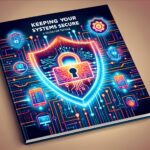Hello fellow tech enthusiasts! In the ever-evolving landscape of technology, one thing remains constant: the importance of keeping your computer safe from cyber threats. The internet can be a dangerous place, with hackers constantly finding new ways to exploit vulnerabilities and steal sensitive information. That’s why it’s crucial to take proactive measures to protect yourself and your data. In this article, we’ll explore some key tips and best practices for computer security that you can implement to keep your digital life safe and secure.
Understanding the Threat Landscape
Before we dive into specific security measures, let’s take a moment to discuss the current threat landscape. Cyber attacks come in many forms, including phishing scams, malware, ransomware, and more. These attacks can have serious consequences, ranging from financial loss to identity theft. With the rise of remote work and online activities, the need for strong computer security has never been more important.
Best Practices for Computer Security
Now that we understand the importance of computer security, let’s explore some best practices that you can follow to protect yourself from cyber threats:
-
Keep Your Software Updated: One of the simplest yet most effective ways to enhance your computer security is to keep your software up to date. Software updates often include security patches that address known vulnerabilities.
-
Use Strong Passwords: Choose passwords that are complex and difficult to guess. Consider using a password manager to securely store and manage your passwords.
-
Enable Two-Factor Authentication: Adding an extra layer of security with two-factor authentication can help prevent unauthorized access to your accounts.
-
Be Mindful of Phishing Attempts: Be cautious of emails, messages, or websites that request sensitive information. Phishing scams are a common tactic used by hackers to steal personal data.
-
Backup Your Data Regularly: In the event of a cyber attack or data loss, having a recent backup of your important files can help you recover quickly and avoid losing valuable information.
Additional Security Measures
In addition to the best practices mentioned above, there are some additional security measures that you can consider implementing:
-
Use a Virtual Private Network (VPN): A VPN encrypts your internet connection, providing an extra layer of security when browsing online.
-
Install Antivirus Software: Antivirus software can help detect and remove malware from your computer, protecting you from potential threats.
-
Secure Your Wi-Fi Network: Change the default password on your Wi-Fi router and enable encryption to prevent unauthorized access to your network.
Conclusion
In conclusion, computer security is an essential aspect of maintaining a safe and secure digital environment. By following the best practices and additional security measures outlined in this article, you can greatly reduce your risk of falling victim to cyber attacks. Remember, staying informed and proactive is key to protecting yourself and your data in today’s interconnected world. So, stay safe, stay secure, and happy computing!










